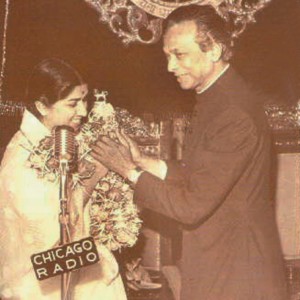In memoriam
The haunting tunes of Naushad
Shahnoor Wahid
Chaley aaj hum jahansey, hui zindagi parayee
Tumhe mil gaya thikana humey maut bhi na ayee...
Who else but music director Naushad could pour so much of pathos, so much of melancholy in the lyrics to touch one's soul in such a special way? The song from the film Uran Khatola had broken all previous chart records of the time. He outshines himself as a composer, especially when the tune changes cadence in thes song at the line, "Kis kaamki ye duniya jo zindagisey kheley" Naushad gave tune to songs in the film Anmol Ghadi and all the songs of that film became instant hits. One is automatically taken on a trip down memory lane when the songs of that film like Keya mil gaya Bhagwan mere dilko dukhakey or Aaja merey barbaad mohabbatke saharey reach the ears over the din of city life. Then came the romantic melody, Tu Ganga ke mouj mein Jamunaki dhara. This song from Baiju Bawra and the others in the same film like O duniyake rakhowale, sun dard bharey mere naley astounded the music critics for his skill in blending classical raga with desi (indigenous) tunes. In fact, it has been said by the critics that the haunting songs of Baiju Bawra carried the film all through to box office. He composed music for the big-budget film Aan, with Dilip Kumar and debutante Nadira in the lead roles. It was once again for songs like Dilme chhupake peyarka tufan le chale or Muhabbat chume jinki haath that film-lovers went back to the movie theatres again and again. Naushad was one of the few greats who dominated the Bombay film music arena from as early as the '40s till the mid-'60s. C Ramchand, Khayyam, Shankar Jaikishan and Laxmikant Pyarelal were his contemporaries. Naushad was very young when he came to Bombay from Lucknow and started to give tunes to film songs. As he had a strong classical base and profound knowledge on the various desi genres of music, especially of north India, his music sounded different for its rich variety in tune fused with uniquely created background orchestration. Mahal (the number Kahi dip jale kahi dil actually shot Lata to the dizzy heights of fame), Andaaz, Babul, Dillagi, Dulari, Didar, Mughal-e-Azam (featuring the Lata greats: Mohabbat ki jhooti kahani pe roye and Pyaar kiya to darna kya), Mother India, Ganga Jamuna, Ram Aur Shyam, Admi, Pakeezah are some of his films whose music became a phenomenal success. Here is an interesting story about Naushad. One day an unknown plump lady came to his house and requested him to create a song for her as she had come all the way from a village to be a singer. He asked her to sing a few lines of some songs. Somehow he liked her voice. Then he got a song written by a friend and composed the tune. When the record of the song was released it took every listener by surprise. It was an absolute stunner. The beautiful song went like this...Afsana likh rahey hain dil-e beqaraarka, akhon mein rang ubharkey tera intezaarka. The singer was Uma Devi. But later people of India were surprised when they discovered that she was none but the 'horizontally challenged' comedienne Tun Tun. From the mid-'60s and onward Naushad did not get many films. However, after a brief lull he came back to complete the unfinished work of music director Ustad Ghulam Mohammed in the film Pakeezah in 1972 and reconfirmed the fact that he was a true maestro. Who can forget the time-transcending songs like Inhi logoney ley liya dupatta mera or Chalte chalte yuhin koi milgaya tha? Naushad's songs not only attained popularity in India, they traversed all man-made boundaries to reach the discerning audience in all the neighbouring states and even beyond. Naushad Ali was given the most prestigious Dadasaheb Phalke Award for his contribution to Indian cinema. The last film that Naushad composed music for was Akbar Khan's Taj Mahal: An Eternal Love Story (2005). He passed away in Mumbai on May 5, 2006. The author is a senior assistant editor of The Daily Star
|

Naushad (R) with Lata Mangeshkar at a function |